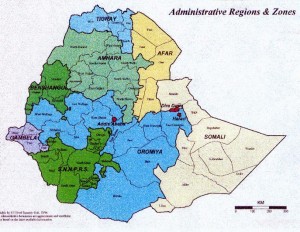By Liban Ahmad
I have read Liban Farah’s, essay on the new President of the Somali region in Ethiopia with interest. Somali region is the deprived Killil. Unlike Oromo and Amhara regions, the Somali Killil remains peaceful and loyal to the EPRDF, but Somalis have not reaped benefits of loyalty. Farah welcomes “the deposition” of Abdi Illey, the former Somali Killil President, and the “imposition” of the new President on the Somali region. In fact, issues that continue to make the Somali region in Ethiopia the least-developed region, pertain to political inequality.
 More than 95 percent of Somalis in the region voted for the ruling EPRDF, thereby bestowing a veneer of legitimacy on the ruling party of Ethiopia. It is questionable legitimacy when a segment of the Ethiopian citizenry has no political party within the ruling coalition.
More than 95 percent of Somalis in the region voted for the ruling EPRDF, thereby bestowing a veneer of legitimacy on the ruling party of Ethiopia. It is questionable legitimacy when a segment of the Ethiopian citizenry has no political party within the ruling coalition.
This political disadvantage affects Somalis in different ways. The Central Government in Addis Ababa allocates more human development projects to the regions whose parties are within the EPRDF coalition. Somali Killil was aligned with the TPLF, but the one-time guerrilla outfit has not made efforts to upgrade the political status of the Somali Killil’s party. Now that the OPDO is the top party of the coalition, it intends to replace the TPLF as the sponsor party of the Somali Killil. Parties within the EPRDF coalition have a stronger say in national policies.
Without addressing the problem of the political inequality in Ethiopia, the change of leadership in the Somali region of Ethiopia bodes ill for Somali-Ethiopians for several reasons. In a political system in which some citizens remain politically unrepresented at the core powerful parties, rulers are able to devise policies that maintain the outsider status of marginalized citizens. The Ethiopian government aims to extract resources in the Somali Killil, but Somalis will have fewer benefits compared to other well-represented ethnic group (e.g. Amhara, Oromo, Tigre and Southern Nations, Nationalities, and Peoples).
The justice system in Ethiopia remains biased towards other politically well-represented Ethiopian ethnic groups. The Qeerroo militias of Oromia region have killed many Somalis, but no one from Oromia has been accused by the Ethiopian government of fomenting ethnic hostilities nor has an independent inquiry into the communal violence been conducted. The OPDO status protects Oromia against demonization. Politically powerful Ethiopian ethnic groups would do well to remember Dr Martin Luther King’s dictum: “Injustice anywhere is a threat to justice everywhere.”
Ethiopia has made political and economic progress since 1991, but it should not rest on its laurels. There are glaring injustices that afflict Somali-Ethiopians. Dr. Abiy Ahmed, Prime Minister of Ethiopia, vowed to prepare Ethiopia for the 2020 elections. It does not seem he has the Somali region of Ethiopia in mind given the political inequality that deprives Somalis of political rights enjoyed by other Ethiopians, who are represented within the ruling EPRDF.
Liban Ahmad
Email:[email protected]
We welcome the submission of all articles for possible publication on WardheerNews.com. WardheerNews will only consider articles sent exclusively. Please email your article today . Opinions expressed in this article are those of the author and do not necessarily reflect the views of WardheerNews.
WardheerNew’s tolerance platform is engaging with diversity of opinion, political ideology and self-expression. Tolerance is a necessary ingredient for creativity and civility.Tolerance fuels tenacity and audacity.
WardheerNews waxay tixgelin gaara siinaysaa maqaaladaha sida gaarka ah loogu soo diro ee aan lagu daabicin goobo kale. Maqaalkani wuxuu ka turjumayaa aragtida Qoraaga loomana fasiran karo tan WardheerNews.
Copyright © 2024 WardheerNews, All rights reserved


